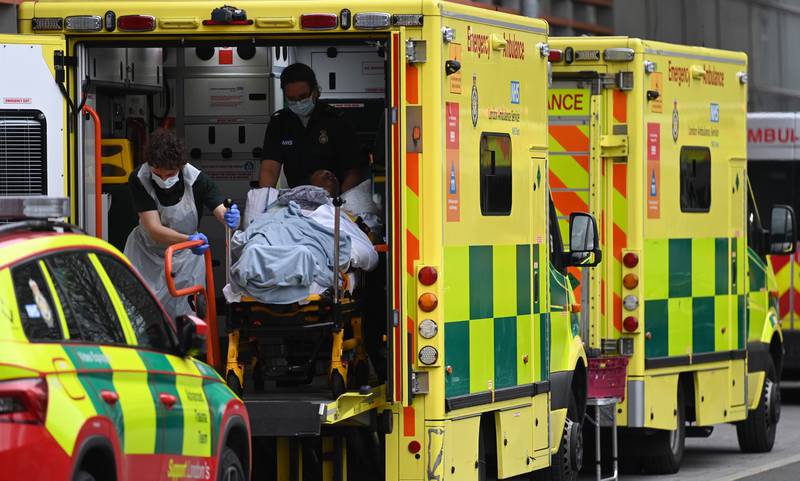UK hospitals told to use private beds for cancer patients

Britain’s National Health Service has instructed doctors not to cancel cancer patients’ appointments and instead send them to private hospitals. The plan is aimed at preventing a repeat of the lack of care available to cancer sufferers during the first lockdown when critically ill people were denied chemotherapy and other life-saving treatment, some of whom died as a result.
Health Secretary Sajid Javid is said to be keen to make use of the independent health sector to cater for the needs of non-Covid-19 patients, enabling NHS hospitals to have more beds for those requiring treatment for the virus.
Last year experts at University College London warned the UK could suffer an extra 10,000 cancer deaths due to the Covid-19 crisis. Reports suggest the plan was put into action at the weekend as part of the UK government’s efforts to avoid further restrictions.
The health secretary’s instructions came after at least 24 NHS trusts – more than one in six – declared critical incidents due to coronavirus pressures.
"NHS staff continue to go above and beyond to ensure people get the treatment they need this winter and our support for the NHS through this challenging period remains at full throttle," Mr Javid said.
"This agreement demonstrates the collaboration across our health care services to create an additional safeguard that ensures people can continue to get the care they need from our world-leading NHS, whenever they need it.
"I encourage everyone to keep doing their bit to look after themselves and their loved ones and, most importantly, for all those eligible, to get boosted now."
David Hare, chief executive of the Independent Healthcare Providers Network, said the deal would help to “bolster planned NHS care including cancer treatment this winter" while ensuring that independent sector providers continued to treat private patients.
"The arrangements will also provide the NHS with additional targeted support in the event that local NHS pressures are deemed as unsustainable,” he said.
NHS England chief operating officer and Covid incident director Sir David Sloman said the agreement meant "as many people as possible" could continue to get the care they needed.
NHS heads have also been asked to assess whether gyms and education centres can be used as “super surge” wards to cater for an overspill of capacity if the need arises. Pop-up health centres are already operating in grounds of some hospitals as part of a move to create up to 4,000 extra beds across England.
Meanwhile, Housing Secretary Michael Gove on Monday was questioned about reports suggesting ministers were preparing to cut the period of self-isolation for Covid-19 from seven to five days.
In an interview with Sky News, Mr Gove, who is also responsible for the prime minister’s "Levelling Up" agenda, said the UK was well on the road to learning to live with the virus but stopped short of saying whether the reports were accurate.
However, he suggested the Cabinet remained open to the prospect of shorter isolation and said “we always keep these things under review”. Mr Gove said the government had adopted “one of the most liberal approaches of anywhere in Europe” when it came to affording people freedom in the middle of the pandemic and said this approach must be balanced with measures to prevent the NHS from becoming overwhelmed.
He said it would be for Prime Minister Boris Johnson and the health secretary to decide whether to cut the period of Covid-19 isolation.
“We always keep things under review because we’re always guided by the facts, by the science and by changing circumstances," Mr Gove said.
“So I think it’s striking to note that in the United Kingdom overall, particularly in England, we have one of the most open regimes, one of the essentially … one of the most liberal approaches of any country in Europe, but we also need to balance that with a determination to ensure that we are not overwhelming the NHS.”
The UK declared 141,472 new Covid-19 cases on Sunday, markedly lower than the highs of more than 200,000 reported over the Christmas and New Year period.
The latest Covid-19 modelling from the London School of Tropical Medicine said the worst-case scenario prediction was for the Omicron variant to result in the deaths of 75,000 people by the end of April. The latest data shows there have been 14 Omicron deaths in the UK.
Asked if the government should reconsider using doomsday modelling to shape its policies, Mr Gove insisted different models needed to be taken into consideration by ministers when making decisions.
He said it would be “irresponsible” of the government not to consult a wide range of possibilities when deciding on what course of action to take. “I don’t think it’s scaremongering at all and no one is setting out to scaremonger,” he said.
“What we are always setting out to do is to ensure that we are in a position to model a range of scenarios and to be ready for those different outcomes.
“I think it would be a mistake not to model some scenarios where the NHS is under very severe pressure so that we can make sure that the resources are there.”
